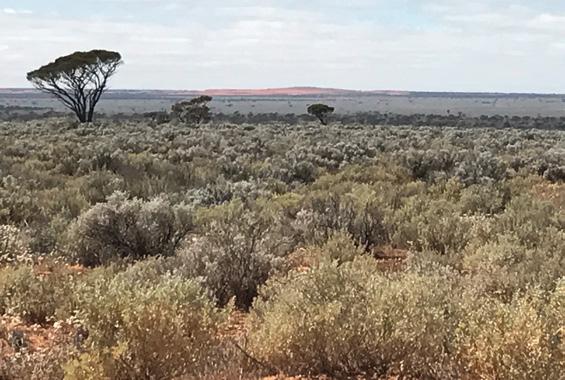
17 minute read
Remnants of Aboriginal history preserved
Aboriginal history from two regions of South Australia will have some help to be recorded and preserved through work being undertaken to capture local memories and knowledge. Projects will soon begin in both the Yorke Peninsula and the Yalata community, with the help of grants from the South Australian History fund, part of the History Trust of South Australia, which aims to make our states’ history accessible to all. The Nharangga Aboriginal Progress Association Inc were recently awarded a $2,500 grant for a community-driven project to uncover Aboriginal history in the Yorke Peninsula area before European arrival, collate historical Nharangga knowledge and produce a cultural history kit. Project Manager Cathy Glazbrook said that white people took over the Yorke Peninsula quickly and within 20 years, 90 percent of the Nharangga people had disappeared and their culture had been ‘decimated’.
“Elders have said that if you ask many Nharangga people who they are, they’ll say they’re Nharangga. If you ask them what that means, they don’t know,” said Glazbrook. “They were here when the St Vincent and Spencer Gulfs were dry land, when there was a land bridge to Kangaroo Island. A lot of their dreaming stories tell these ancient facts, so we want to share Aboriginal history that is mainstream, that is for everybody, and we want to teach it to kids.”
Advertisement
Glazbrook is researching culture pre-European settlement and will give the information uncovered back to the community to help locals to reclaim their identity. Memories of Yalata will also be captured by Indigenous policy researcher and writer Eleanor Hogan, who was recently awarded a $4,755 grant from the SA History fund. This assistance, alongside another smaller grant she’s received from the Oral History Association of South Australia and the Northern Territory, will allow her to travel to and spend more time in the Yalata community, a place she is quite familiar with. There, she plans to record the stories and memories of three senior Yalata women, transcribe them into a booklet with English and Pitjantjatjara translations and have them archived for the local community. “They have seen a huge amount of historic change from the time when they were living along the railway line on the Nullarbor in the 1930s and 1940s,” Hogan said. That includes issues of land rights, the Maralinga nuclear testing site in the 1950s, the Missions, the impact of alcohol in the community and their participation in its restrictions.
Ooldea railway, near Yalata. Image courtesy of Eleanor Hogan. Left: Eleanor Hogan at Ormiston Gorge. Above: Ooldea, visited by Eleanor Hogan with Yalata community members. Images courtesy of Eleanor Hogan.
Hogan, who calls Alice Springs home, got to know the rich history of the Yalata region and many of its residents whilst researching her upcoming book, Into the Loneliness: the Unholy Alliance of Ernestine Hill and Daisy Bates, which will be published in March 2021.
She met with Elders in their 70s and 80s twice over the last few years for this and discussed ways of recording their stories for the benefit of the region.
“The older generation of remote Aboriginal people tend to have more health issues earlier, so you’ve got less people to draw on for Pitjantjatjara history – the memories of past eras will be gone soon.”
Inquir y into remote communit y stores
A parliamentary committee has shared their recommendations for improving food availability and affordability in remote Aboriginal communities. The committee led by Julian Leeser MP, met to ensure remote communities had adequate food supplies during the coronavirus pandemic.
“It is important to acknowledge that this is the third time this matter has been examined in recent years and none of those inquiries has resolved the concerns about food prices and security that have been expressed,” Julian Leeser MP said in the Report on food pricing and food security in remote Indigenous communities. “The supply of quality and affordable food is often unstable due to poor infrastructure, seasonal changes and the high costs of living and operating stores remotely,” he said.
Recommendations include the establishment of a live price monitoring system across all remote stores, upgrades to road infrastructure and more wholesale distribution centres to make it easier to deliver food to communities.
There were 124 submissions to the inquiry with evidence of expensive and limited groceries when compared to non-remote communities.
The committee has also urged the Australian Competition and Consumer Commission to provide their own recommendations with a market study on remote stores.
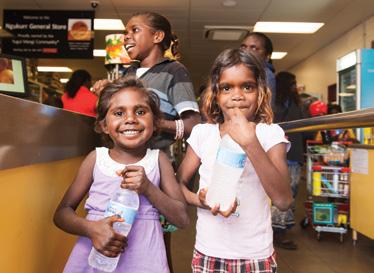
Katharine McBride, University of South Australia.
Research led by University of South Australia PhD candidate Katharine McBride has found what makes the heart strong for Aboriginal and Torres Strait Islander women.
The life expectancy of Aboriginal women is 75.6 years, compared to 83.4 years for non-Aboriginal women. Cardiovascular disease is the leading cause of death for Aboriginal women and McBride’s research shows what can happen to change this to meet the 2031 Closing the Gap target. According to McBride’s paper, Good Heart: Telling Stories of Cardiovascular Protective and Risk Factors for Aboriginal Women, the current approach to heart health is not working because the model of care fails to meet Aboriginal women’s cultural needs. “We spoke to people who had been impacted by heart disease and strokes and asked them what was important and where the gaps were,” said McBride. “One was that there was a really clear message that we needed to be working on prevention and stopping heart disease before people got sick and ended up in hospital.”
Anna Dowling, a Yamatji Badimia woman and Research Assistant at South Australian Health and Medical Research Institute, is a member of the advisory group which helped McBride understand how to improve the cardiovascular health of Aboriginal women. “A respectful way of doing research is to ensure it is governed and guided by Aboriginal people. Katharine set up the advisory group so that we can provide our input and guidance throughout the whole process,” said Dowling.
The advisory group agreed that Aboriginal women’s voices need to be prioritised to understand what protects the heart and puts it at risk. The study involved speaking with five established women’s groups in South and Central Australia. The conversations happened in yarning circles where the women were comfortable to share their stories and thoughts about heart health.
“A couple of members of the advisory group and I went through those stories and started to pull out some of the messages,” explains McBride. “We went back to the women in the women’s groups and said, have we captured everything? Have we missed anything? Are we telling the stories that you wanted to tell? And then the advisory group came together in person and then online and wrote that narrative together.”
Anna Dowling, Research Assistant at SAHMRI. The figure below shares this narrative, including 10 personal attributes which keep a woman’s heart strong or sick and eight socio-ecological factors which affect a woman’s capacity to care for her heart. “A lot of people said that something that empowers them to care for their heart was having good information and knowledge on how to care for their heart and what their risk profile looked like, and whether they were doing the right things,” said McBride. Aboriginal women 30 years and over should have a regular Heart Health Check with their doctor.
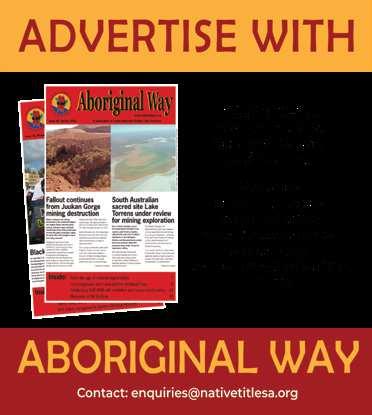
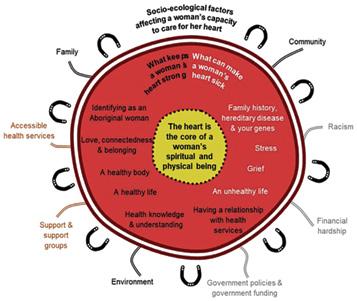
Image source: Telling Stories of Cardiovascular Protective and Risk Factors for Aboriginal Women.
Thousands of cashless welfare card users, many of them Indigenous, will continue using the Cashless Debit Card (CDC) for another two years after a failed attempt to make it permanent by the Federal Government. The Senate agreed to continue trialling the program, which has been labelled ‘racist’ and ‘punitive’ by many users and onlookers including Labor and Greens senators, after Social Services Minister Anne Ruston put forward a last-minute proposal when it looked set to be voted down by independent senator Rex Patrick indicating he would vote against it. The Federal Government had wanted to make the divisive scheme permanent across the trial sites of Ceduna in South Australia, the East Kimberley and Goldfields in Western Australia, and Bundaberg and Hervey Bay in Queensland, and extend it into Cape York and the Northern Territory. Amendments were put forward in attempts to get Centre Alliance Senator Stirling Griff on board, but he chose to abstain from the vote despite earlier indications he would oppose the original bill, leading it to pass by just one vote. Under the new deal, the scheme will remain in the trial sites but won’t be extended to the new areas or made compulsory, which would have seen thousands of Territorians automatically moved onto it from the BasicsCard, a program introduced during the 2007 Northern Territory intervention, after a separate amendment was passed to make the transition voluntary. The CDC program puts 80% of a person’s welfare payments onto a debit card, which can’t be spent on alcohol or gambling products, gift cards, or to withdraw cash. Ms Ruston told the Senate that 76 percent of people on the card in Ceduna were Indigenous, alongside 82 percent in the Kimberley region, 48 percent in the Goldfields and 18 per cent in the Queensland locations, evidencing many people’s long-held view that the scheme, which has been going since early 2016 in some locations, disproportionately affects Aboriginal and Torres Strait Islander people. Cheryl Axelby, Co-Chair of Aboriginal-led justice organisation, Change the Record told the ABC that the program discriminates against Indigenous Australians. “It’s very shameful and embarrassing. What it does, from what we’ve heard from community members, is actually further punishes them.” The Government have not released Adelaide University’s $2.5 million final evaluation on the program which would indicate what impact, if any, it has had on levels of gambling, alcohol and drug use. The bill now needs to return to the lower house for the amendments to be approved.
Newly published children’s books with Aboriginal focus
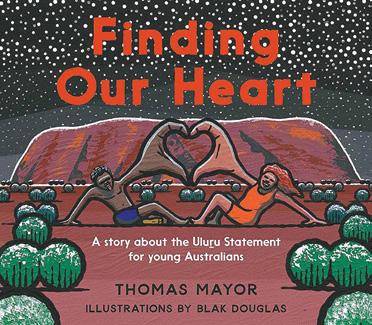
Finding Our Heart
by Thomas Mayor, illustrated by Blak Douglas
A story about the Uluru Statement for young Australians
Finding Our Heart is a book directed at 5–10 year olds by Torres Strait Islander author Thomas Mayor, following on from his first bestselling book (directed at adults) Finding the Heart of the Nation – the journey of the Uluru Statement towards Voice, Treaty and Truth.
Finding Our Heart breaks down the Uluru Statement for young minds to more easily learn about the campaign to achieve voice, treaty and truth, and to share their findings with their parents and siblings at home.
“The idea came from my children, and I see other children, tell their families about what they learn at school…” said Thomas Mayor.
“My son’s learning language all the time and coming home and telling us about it, so I thought it would be a wonderful idea to write a children’s book to help children understand the Uluru Statement but also so they could go home and tell their families.”
Illustrations by Dhungatti artist Blak Douglas from Redfern.
Published by Hardy Grant, 1 June 2020.
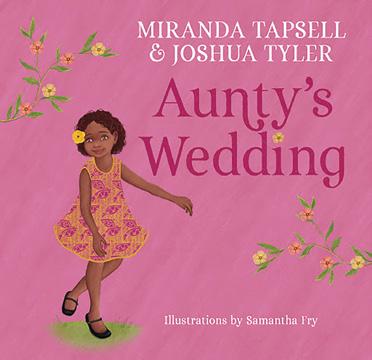
Aunty’s Wedding
by Miranda Tapsell and Joshua Tyler, illustrated by Samantha Fry
A Tiwi-Island girl prepares for her aunty’s wedding alongside her Maningawu (grandmother) in this warm and lively picture book for 2–5 year olds.
Penned by the co-writers of the hugely successful Australian movie Top End Wedding, popular Larrakia actor, writer and activist Miranda Tapsell and Joshua
Tyler, who grew up in the Barossa Valley on Peramangk country, Aunty’s Wedding follows along the same theme, with beautiful illustrations by talented
Dagoman artist Samantha Fry.
This delightful book will introduce little children to some of the fun rituals encountered at a wedding, including descriptions of some Top
End customs with words in Tiwi language, with a handy glossary at the back.
Published by Allen & Unwin, 1 September 2020.
Respect
by Aunty Fay Stewart-Muir and Sue Lawson, illustrated by Lisa Kennedy This delicate picture book combines pared-back text with bold illustrations as it teaches children the age-old role respect plays in our lives.
Written by Boonwurrung Elder Aunty Fay Stewart-Muir and award-winning children’s author Sue Lawson, Respect features illustrations from Trawlwoolway artist Lisa Kennedy that are reminiscent of ancient techniques while still capturing a modern style on the page.
This is first title in Magabala Books’ ‘Our Place’ series of four children’s picture books introducing little ones to important elements of Aboriginal and Torres Strait Islander culture.
Published by Magabala Books, 1 May 2020.
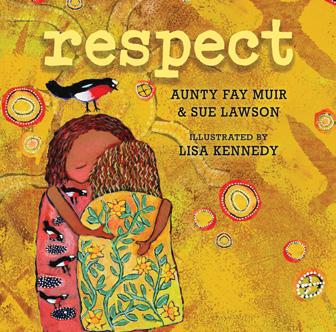
Great- Grandpa Liman lives in a small house by the sea. There are no lights – just stars as far as the eye can see. Hello Hello
written and illustrated by students from Laverton, Menzies and Tjuntjuntjara remote community schools at the third Spinifex Writing Camp, sponsored by the Indigenous Literacy Foundation. Straight from the imaginations of kids from three remote Western Australian towns comes the spookiest book to emerge from the Spinifex Writing Camp so far!
Students were joined by ILF ambassador and award-winning illustrator Ann James and singer/songwriter Chris Aitken and have together created a picture book to intrigue the young and the young at heart.
Published by the Indigenous Literacy Foundation, March 2020.
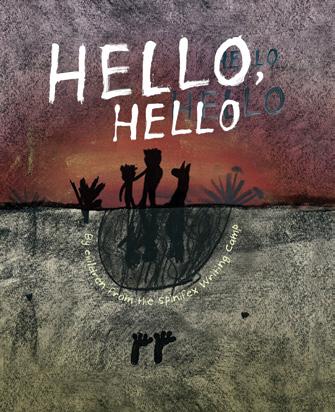
Brother Moon
by Maree McCarthy Yoelu, illustrated by Samantha Fry Great-Grandpa captivates his greatgrandson with the mysterious story of his brother who guides his connection to Country and shows him the way in the dark in this gentle, charming story.
The masterful storytelling by GreatGrandpa will have little ones guessing at who his brother could be right to the end (if the title doesn’t give it away!). At the end of the book we learn about the author’s own grandfather, a respected Wadjigany man who was a leader amongst his people and the community as he lived off the land and travelled across the sea.
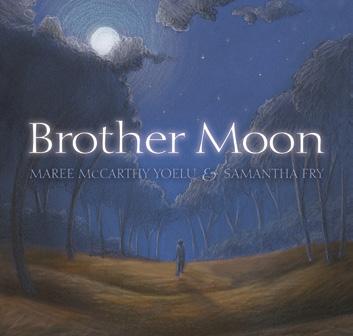
Published by Magabala Books, 1 March 2020.
Tarnanthi Ar t Fair
Over one sunny weekend in December, the Tarnanthi Art Fair was held in a large marquee at Lot Fourteen. The event featured a curated display of Aboriginal and Torres Strait Islander works for sale, handpicked by community-run art centres across the country to highlight established, mid-career and emerging artists. A broad selection of paintings, carvings, weavings, jewellery, clothing, textiles and homewares were available for purchase.
An online portal also available at the time allowed people to browse and purchase an extensive selection of art directly from art centres, wherever they were based.
Promoted as an ethical way to buy unique pieces of art, the Tarnanthi Art Fair ensured that every cent from every purchase went directly back to artists and their communities.
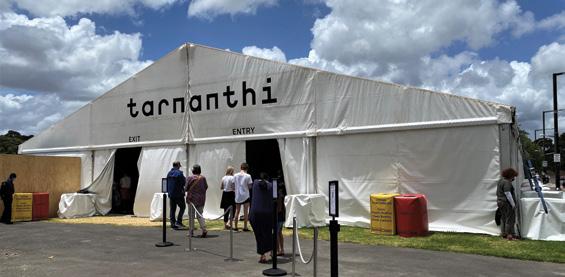
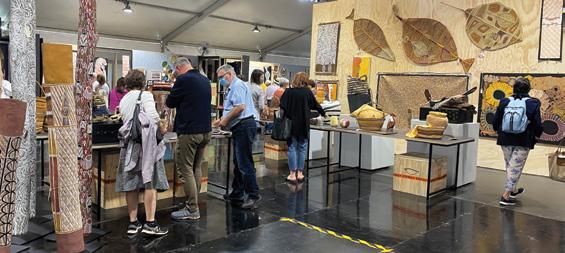
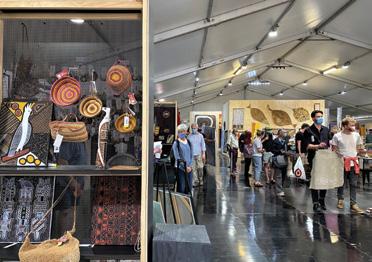
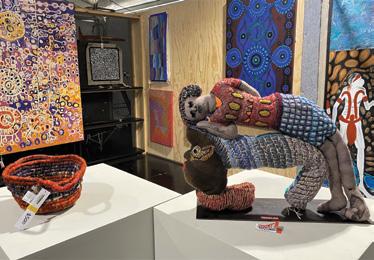
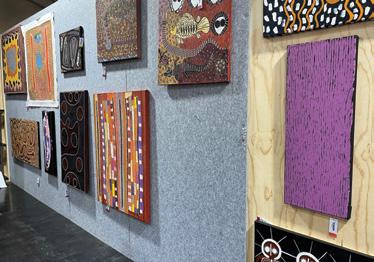
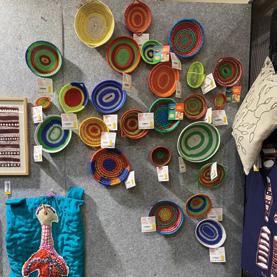
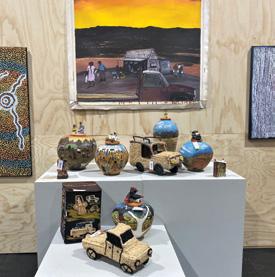
Adnyamathanha dictionary launched
The first ever dictionary of the Adnyamathanha language of the Flinders Ranges region was published in Adelaide late last year. Written by co-authors Terrence and Josie Coulthard, the 400-page Adnyamathanha Culture Guide and Language Book delves into cultural practices, muda (songlines), music, social history, the kinship system and grammar alongside a two-way dictionary – English to Adnyamathanha and Adnyamathanha to English. Adnyamathanha speaker Terrence Coultard, who grew up in Nepabunna in the Northern Flinders Rangers, has been developing the resource since the mid-1980s and includes in it knowledge passed on from other language speakers and Elders, some of whom have since passed. Both authors use the language in their day-to-day life with family, in their roles as teachers for the Education Department, and at their family’s Cultural Tourism Centre at Iga Warta in the Northern Flinders Rangers.
The University of Adelaide’s Mobile Language Team supported the project, with linguists and graphic designers working closely with the Coulthard’s over 18 months to finalise it.
The book was officially launched in November at the University of Adelaide, followed by two more subsequent launches at Wilpena Pound and Iga Warta.
Adnyamathanha Culture Guide and Language Book is available for purchase through Openbook Howden.
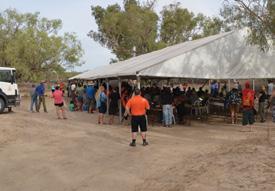
South Australian Native Title Ser vices (SANTS) for your organisation
SANTS is an independent Aboriginal organisation with proven experience and expertise in providing a wide range of professional services to South Australian Aboriginal Nations. We are responsive to the needs and priorities of Aboriginal Corporations and can bring a unique understanding of and respect for culture and communities in our provision of services. We offer services in: • Corporate Governance • Native Title Legal Services • Corporate Administration • Financial Management • Community Development • Human Resources Management SANTS offers a very competitive fee structure to Aboriginal Corporations to suit their financial circumstances.
Contact our Manager of Corporate and Community Development for a confidential discussion and further information: (08) 8110 2800 | info@nativetitlesa.org | www.nativetitlesa.org
SOUTH AUSTRALIAN NATIVE TITLE SERVICES
Level 4 345 King William Street ADELAIDE SA 5000
Editor Keith Thomas
Communications Officers Joy Lothian Caleb Sweeting
Designer Alison Fort
Advertising Enquiries (08) 8110 2800
Circulation 10,000
If you have any stories of interest to our readers, please address any correspondence to:
editor@nativetitlesa.org
Aboriginal Way South Australian Native Title Services Level 4 345 King William Street ADELAIDE SA 5000
Ph: 8110 2800 Fax: 8110 2811 FREECALL: 1800 010 360
The Editor has the final decision on all stories and advertising that appear in this publication.
w w w.nativetitlesa.org
Tjayiwara Unmuru Compensation Application
De Rose Hill Compensation
Application De Rose Hill
MINTABIE ! ( Tjayiwara Unmuru Native Title Claim
Eringa Irrwanyere Mt Dare Native Title Determination Eringa Part A Proceeding Wangkangurru/Yarluyandi Part A Proceeding
Eringa No. 2 and Wangkangurru/Yarluyandi
Yankunytjatjara/Antakirinja SC2013/001 Arabana No 2
The Wangkangurru/ Yarluyandi Native Title Claim Yandruwandha/ Yawarrawarrka Native Title Claim
Legend Native Title Determination Area (NNTT name shown) Native Title Applications coloured (NNTT number and name shown) Land Tenure Aboriginal Freehold Reserve/Park
SC2018/002 Walka Warni Oodnadatta #2 SC2013/003 Walka Warni Oodnadatta
Antakirinja Matu-Yankunytjatjara
COOBER PEDY Arabana People Dieri No. 3
SC2013/001 Arabana No 2 Dieri
Adnyamathanha No 1 - Stage 3
Dieri No.2 Native Title Claim
Adnyamathanha People No. 1 (Angepena Pastoral Lease)
ROXBY DOWNS LEIGH CREEK
Adnyamathanha People No. 1 (Stage 1)
Far West Coast Kokatha People ! ( (Part A)
WOOMERA Adnyamathanha People No. 2 Adnyamathanha No. 1
SC2016/001 Far West Coast Sea Claim
CEDUNA
SC2019/002 Wirangu #3
0 100 200
SN2019/001 Attorney General for South Australia (Wirangu)
Kilometres
Geocentric Datum of Australia 2020
Prepared by: Geospatial Services, National Native Title Tribunal 2/02/2021
SC2021/001 Neville Bilney & Ors on behalf of Wirangu Sea Claim Native Title Claim Group Gawler Ranges People
SC1997/006 Wirangu No. 2 Native Title Claim
STREAKY BAY
SC2018/001 Nauo #3 Adnyamathanha People Native Title Claim No. 3 SC1996/005 Nukunu Native Title Claim
QUORN
SC1996/004 Barngarla Native Title Claim
WHYALLA PORT AUGUSTA
Nukunu Part A
PORT PIRIE
Barngarla Native Title Claim
SC1997/008 Nauo Native Title Claim
PORT LINCOLN
SC2016/003 Nauo No. 2 SC2013/002 Narungga Nation
Kaurna Peoples Native Title Claim Adnyamathanha No 1 - Stage 2
Adnyamathanha, Ngadjuri and Wilyakali Overlap Claim
PETERBOROUGH
JAMESTOWN ! (
SC2011/002 Ngadjuri Nation #2 SC2012/001 Wilyakali
CLARE
ADEL AI DE First Peoples of the River Murray & Mallee Region
BERRI
SC2019/001 First Peoples of the River Murray and Mallee Region #2
MURRAY BRIDGE
Ngarrindjeri and Others Native Title Claim
South Australia
Native Title Applications and Determination Areas As per the Federal Court (1 February 2021)
SC1998/004
Ngarrindjeri and Others Native Title Claim SC2017/001 First Nations of the South East #2
BORDERTOWN
KINGSTON S.E.
SC2017/002 First Nations of the South East #1
MOUNT GAMBIER ! (
Get Aboriginal Way
ISSUE 81 Individuals or organisations can request free copies of this publication. Complete the form below and mail to 4/345 King William Street, Adelaide 5000 or email details to editor@nativetitlesa.org Name: ____________________________________________________ Address: __________________________________________________ Postcode: _______________ Phone: ____________________________________________________ Email: ____________________________________________________ No. of copies: ______________________________________________
…airs weekly on Indigenous and community radio. If you have an interesting story or event that you would like to share on radio, please call (08) 8110 2800 or email editor@nativetitlesa.org Listen online at https://www.nativetitlesa.org/aboriginal-way



